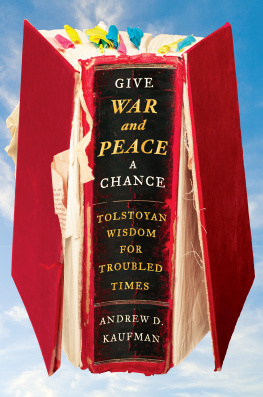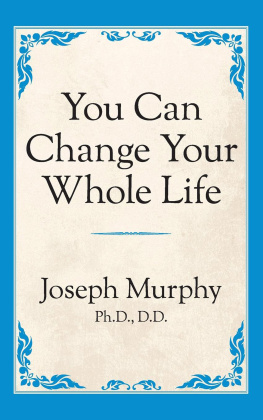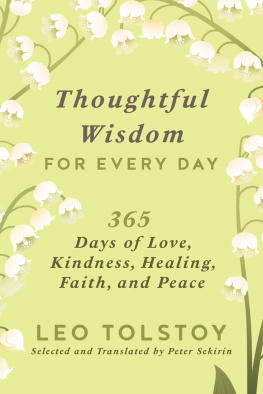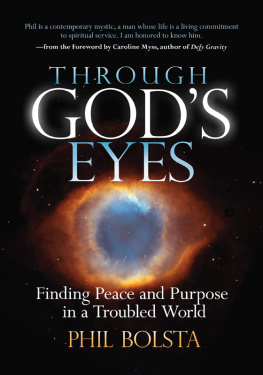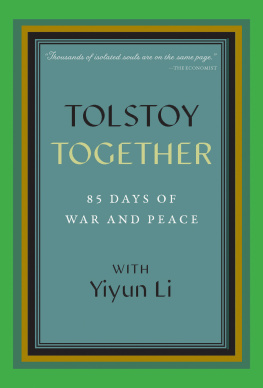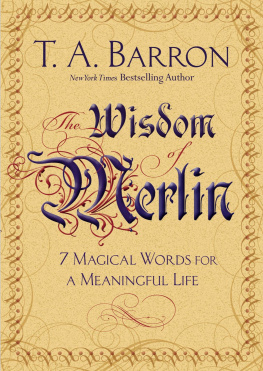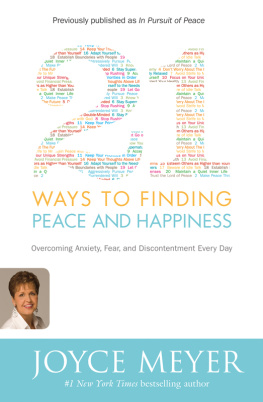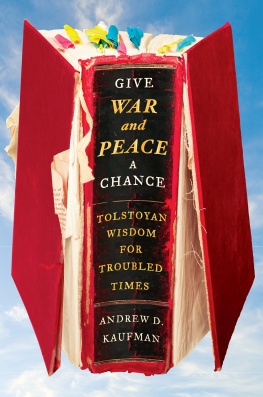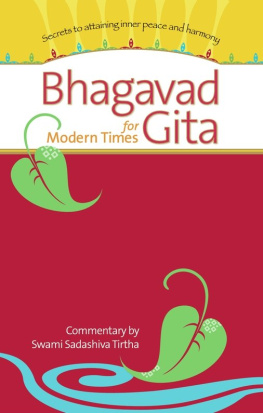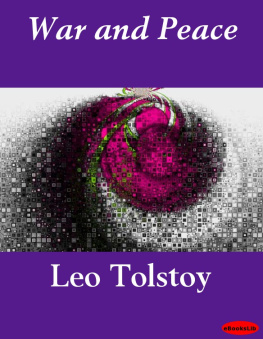Thank you for downloading this Simon & Schuster eBook.
Join our mailing list and get updates on new releases, deals, bonus content and other great books from Simon & Schuster.
C LICK H ERE T O S IGN U P
or visit us online to sign up at
eBookNews.SimonandSchuster.com
We hope you enjoyed reading this Simon & Schuster eBook.
Join our mailing list and get updates on new releases, deals, bonus content and other great books from Simon & Schuster.
C LICK H ERE T O S IGN U P
or visit us online to sign up at
eBookNews.SimonandSchuster.com
Contents

FOR C ORINNE AND I AN ,
who inspire me every day
to love life in all its countless, inexhaustible manifestations
To be able to affect others, an artist has to be an explorer, and his work of art has to be a quest. If he has discovered everything, knows everything, and is just preaching or entertaining, he makes no effect. Only if he keeps searching, then the viewer, or listener, or reader fuses with him in his search.
Tolstoys diary, December 1900
An Invitation to the Reader

A rriving at Amherst College in the fall of 1987, I was pretty certain Id choose economics or political science as a major, and continue studying Russian language on the side, as Id been doing since my junior year in high school. Gorbachev had come into power just a few years earlier and with business opportunities opening up in the then Soviet Union, my parents had wisely suggested that, even as a Michigan high school student, I start learning Russian at a local college. I had no idea at that time how such a seemingly insignificant decision made for pragmatic reasons, would lead straight to the most important spiritual journey of my life.
As a college sophomore I found myself in a Survey of Russian Literature class, in which within the first few weeks the professor had been ambitious enough for us all to assign what is arguably one of the worlds most daunting novels, Tolstoys masterpiece War and Peace . There I was, trudging around the rolling campus with that almost comically obese paperback, its pages splayed out, nicked and softened under the strain of that four-figure page count, the strain of so much use. Evenings Id curl up with the novel on the ragged red love seat across from the stacks in the basement of Frost Library, or, when my roommates were out, under the covers of my creaky dorm-room bed. As I waded through the ocean of details, impressions, and barely pronounceable names, I found myself increasingly seduced by a world that, for all its foreignness, started to seem... strangely familiar.
One life-sized character in particular stepped forward as if to speak right to me: Pierre Bezukhov, the bumbling, bespectacled twenty-year-old who has just returned from a ten-year stay in Europe and is now trying to find his place in a rapidly changing Russia. As the proverbial small-town midwestern boy whod just been thrown into what seemed to me a coldly competitive Northeast, I saw plenty of myself in this cloddish young soul, and in his passionate quest for a life that was meaningful, authentic, and complete. Pierres long, tortuous journey toward truth captivated and inspired me. And so, if initially Id been losing myself in Tolstoy, I soon enough began to find myself there.
Leo Tolstoy and I have been together for almost twenty-five years now. It has been one of my longest relationships, not to mention one of my most intense, as my wife Corinne recently observed, watching me with some concern as I lovingly caressed the tattered cover of that old college copy of War and Peace . Weve had our ups and downs, Tolstoy and I, our disagreements, even a couple of separations. After graduate school I was so burnt-out by the academic life that I left the writer and Russian literature altogether to pursue what I saw then as a promising career as an actor. When I returned to the old count a few years later, I was surprised to find he had grown somehow even wiser in my absence, War and Peace as fresh and as important to me as when Id first encountered it all those years earlierall the more so, in fact. And, as with most long-term relationships that last, I rediscovered the reasons I fell in love in the first place.
It is Tolstoys combination of skepticism and hope that I have always loved most about his workthat childlike curiosity about everyone and everything he sees, coupled with a wise awareness of whos who and whats what. I love his courage to believe in human goodness even when his rational mind offers a thousand reasons why he shouldnt, his total willingness to plunge right into the river of life, to play and splash and kick around in it, knowing full well that somewhere downstream a raging waterfall surely looms.
When Russian tenth graders today are assigned War and Peace , the boys often read only the war sections, and the girls, only those concerned with peace. Yet by doing so, both are not just missing out, but, well, missing the point . It is perhaps worth pointing out that the word for peace in Russian is identical to the word for world or cosmos mir , pronounced meer. So, when Russians hear the title of the novel, they are hearing not just War and Peace , but also War and the World , which, in fact, captures an essential dimension of this novel missing in the English rendition. Whether youre ducking bullets on the battlefield or dodging your colleagues sally at a council of war; whether youre a commander preparing to oust the foreign enemy or a salon hostess trying to get rid of an annoying guest; whether youre a general navigating your troops through the Russian countryside or a teenage Russian boy preparing your father for the news that youve just lost forty-three thousand rubles, life, Tolstoy tells us, is a battle . It is also movement and change: There is nothing stable in life, Tolstoy said when he was in his seventies. Its the same as adapting to flowing water. Everythingpersonalities, family, society, everything changes, disappears and re-forms, like so many clouds. You hardly have time to get used to one social condition before its already gone and become another.
Yet amid all that discord, out of all that conflict there emerges in War and Peace a strange, hopeful vision of the world as a place that does, in the end, make a kind of sense. And if this loose, baggy monster of a book refuses to tie things together into a nice, elegant literary package of the sort the American writer and critic Henry James was hoping for, neither does it leave us with the impression that, as some of Tolstoys enlightened contemporaries believed, the world we inhabit is merely a vast interplay of physical, chemical, and biological stimuli. Life, Tolstoy shows, is both messy and meaningful, prosaic and poetic, sensuous and... sensible. And in order to communicate that vision, he needed to find a way of writing that was both more specific and more encompassing than that offered by the highly specialized, ideologically divisive worldviews of so many of his contemporaries.
In clever art criticism, Tolstoy wrote to his friend, the philosopher Nikolai Strakhov, in 1876, everything is the truth, but not the whole truth, and art is only art because it is whole. For that reason, he explained in another letter to Strakhov, we need people who would show the senselessness of looking for ideas in a work of art, but who instead would continually guide readers in that endless labyrinth of linkages that makes up the stuff of art....: people, in other words, who, rather than deconstructing a work of fiction to promote their own ideological or professional agendas, would attempt to reconstruct that work for the benefit of readers everywhere; people who, instead of dissecting a book as if it were some petri dish specimen, would strive to engage with it as fully as they might with any living, breathing organism.
Next page
